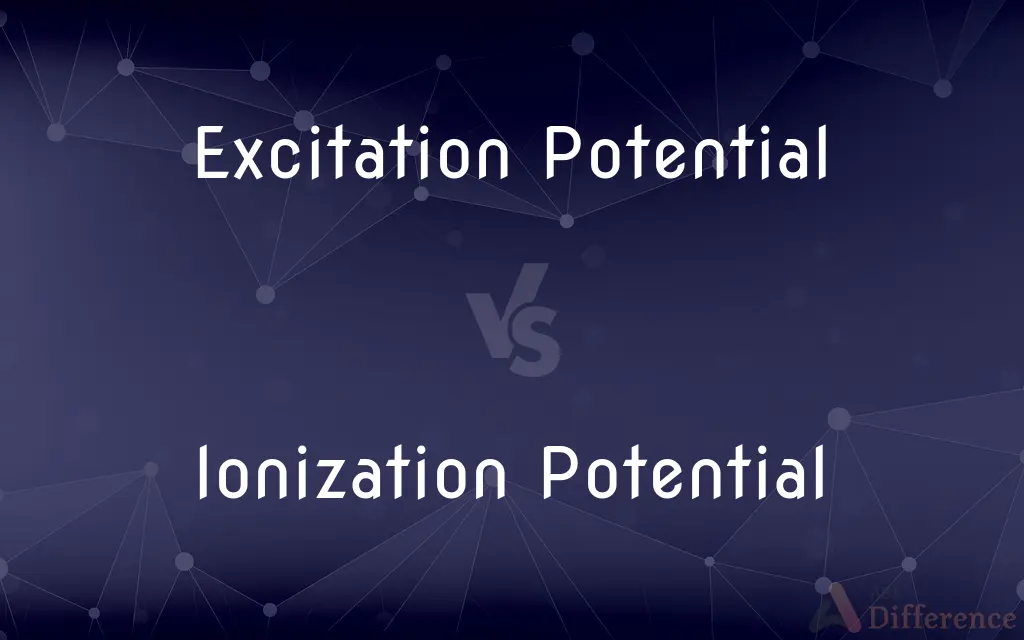Excitation Potential vs. Ionization Potential — What's the Difference?
By Tayyaba Rehman — Published on December 17, 2023
Excitation potential refers to energy needed to move an electron to a higher orbit, while ionization potential is the energy to remove an electron entirely.

Difference Between Excitation Potential and Ionization Potential
Table of Contents
ADVERTISEMENT
Key Differences
Excitation Potential and Ionization Potential are concepts rooted in atomic physics, primarily dealing with electrons and their energy levels. Their implications provide insights into atomic behaviors.
Excitation Potential is the minimum energy required to transition an electron from its ground state to an excited state within an atom. In this context, the electron isn't removed from the atom but simply moves to a higher energy orbit. On the other hand, Ionization Potential pertains to the energy necessary to entirely strip an electron from an atom or ion, leading to the creation of a cation.
When considering atomic behavior, Excitation Potential is often seen in phenomena like fluorescence, where atoms return to their ground state from an excited state, emitting light. Contrarily, Ionization Potential becomes relevant in discussions around atomic bonding or ionization processes, where electron removal can result in charge imbalances and atomic interactions.
In practical terms, a substance with a low Excitation Potential can easily have its electrons excited to higher energy levels. Conversely, elements with a high Ionization Potential indicate that it's challenging to remove their electrons, often suggesting the element's noble nature.
To sum it up, while both Excitation Potential and Ionization Potential deal with electron energies, they describe distinct phenomena: one concerns internal electron transitions, and the other tackles electron removal from the atomic structure.
ADVERTISEMENT
Comparison Chart
Definition
Energy for electron's higher orbit transition
Energy to remove an electron entirely
Results in
Electron in excited state
Creation of a cation
Practical Implication
Seen in fluorescence
Relevant in atomic bonding
Relation to Electrons
Internal transition
External removal
Significance
Electron's energy level alteration within atom
Electron's complete ejection from atom or ion
Compare with Definitions
Excitation Potential
Seen in atomic behaviors like fluorescence.
Studying Excitation Potential helps understand atomic light emissions.
Ionization Potential
Measures electron's attachment strength to an atom.
Atoms with low Ionization Potential can easily lose electrons in reactions.
Excitation Potential
Doesn't lead to electron removal.
Excitation Potential only shifts electron orbits, not removing them.
Ionization Potential
Significant in atomic bonding discussions.
Ionization Potential values are crucial for predicting chemical reactivity.
Excitation Potential
Determines susceptibility to internal energy changes.
A low Excitation Potential means easier electron transitions within the atom.
Ionization Potential
Energy required for electron's total removal.
Noble gases have a high Ionization Potential due to their stable nature.
Excitation Potential
Energy for electron's higher energy transition.
The Excitation Potential of hydrogen determines its spectral lines in emission spectrums.
Ionization Potential
Pertains to creation of cations.
High Ionization Potential elements resist becoming cations.
Excitation Potential
Amount needed for electron's internal movement.
An atom's Excitation Potential impacts its fluorescence properties.
Ionization Potential
Represents resistance to electron loss.
Elements with high Ionization Potential are less likely to donate electrons.
Common Curiosities
Which potential leads to cation formation?
The Ionization Potential as it results in electron removal.
Does Excitation Potential remove electrons?
No, Excitation Potential only moves electrons to higher energy levels.
What is Excitation Potential?
It's the energy required to shift an electron to a higher orbit within an atom.
What's the significance of Ionization Potential in chemistry?
It predicts elements' chemical reactivity and bonding capabilities.
Which potential is linked to internal electron transitions?
The Excitation Potential.
Do all atoms have both potentials?
Yes, all atoms exhibit both Excitation Potential and Ionization Potential.
Can Ionization Potential lead to anion formation?
No, Ionization Potential is about electron removal, resulting in cations.
How does Ionization Potential differ?
Ionization Potential is the energy needed to remove an electron from the atom completely.
Which potential has implications in atomic bonding?
The Ionization Potential.
What happens when Excitation Potential is supplied to an atom?
The electron moves to a higher energy orbit but remains within the atom.
Are these potentials constant for all atoms of an element?
Largely yes, but external factors like pressure can influence observed values.
Where do we observe effects of Excitation Potential?
In phenomena like fluorescence or atomic spectral lines.
Is a higher Ionization Potential good for electron retention?
Yes, a high Ionization Potential means the atom resists electron loss.
Does a high Excitation Potential mean an atom is easily excited?
No, a higher Excitation Potential means more energy is needed to excite the atom.
Why do noble gases have high Ionization Potential?
Because they have stable electron configurations and resist electron loss.
Share Your Discovery

Previous Comparison
Pathetic Fallacy vs. Personification
Next Comparison
Personal Area Network vs. Local Area NetworkAuthor Spotlight
Written by
Tayyaba RehmanTayyaba Rehman is a distinguished writer, currently serving as a primary contributor to askdifference.com. As a researcher in semantics and etymology, Tayyaba's passion for the complexity of languages and their distinctions has found a perfect home on the platform. Tayyaba delves into the intricacies of language, distinguishing between commonly confused words and phrases, thereby providing clarity for readers worldwide.












































